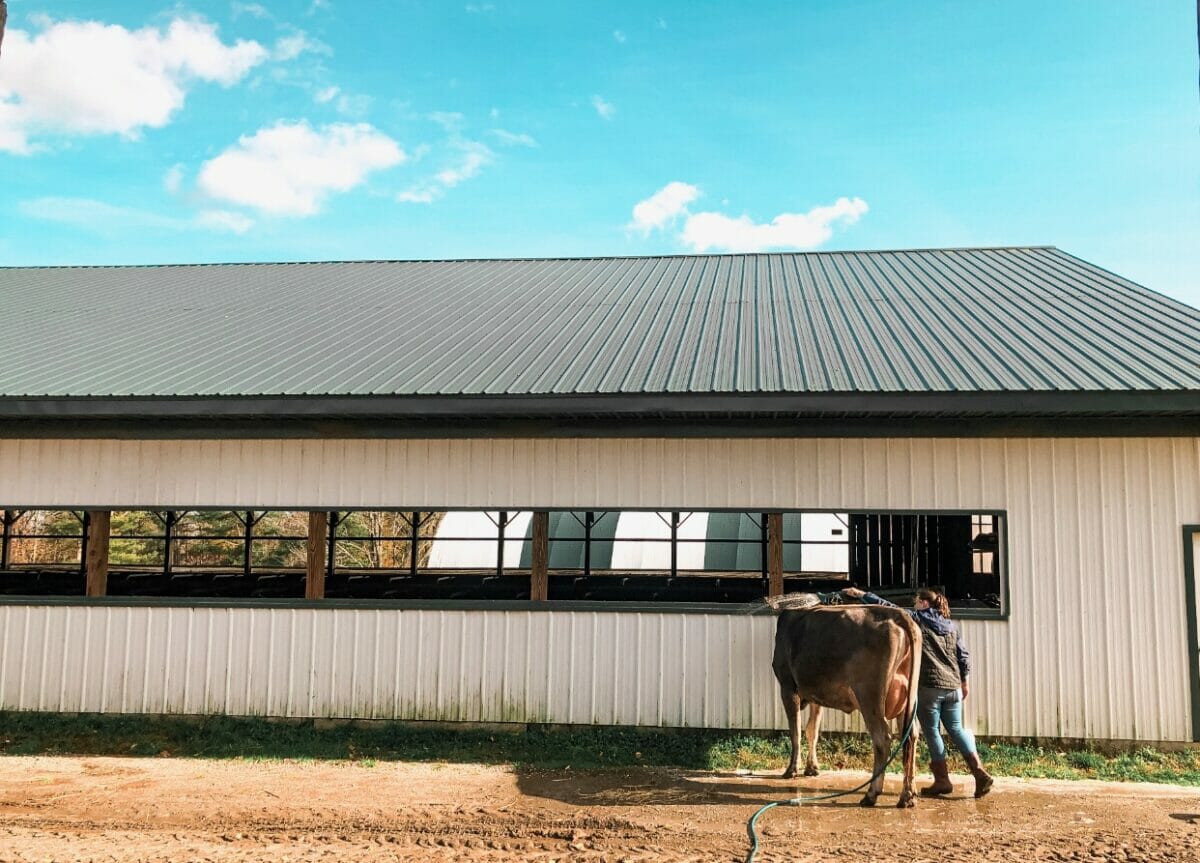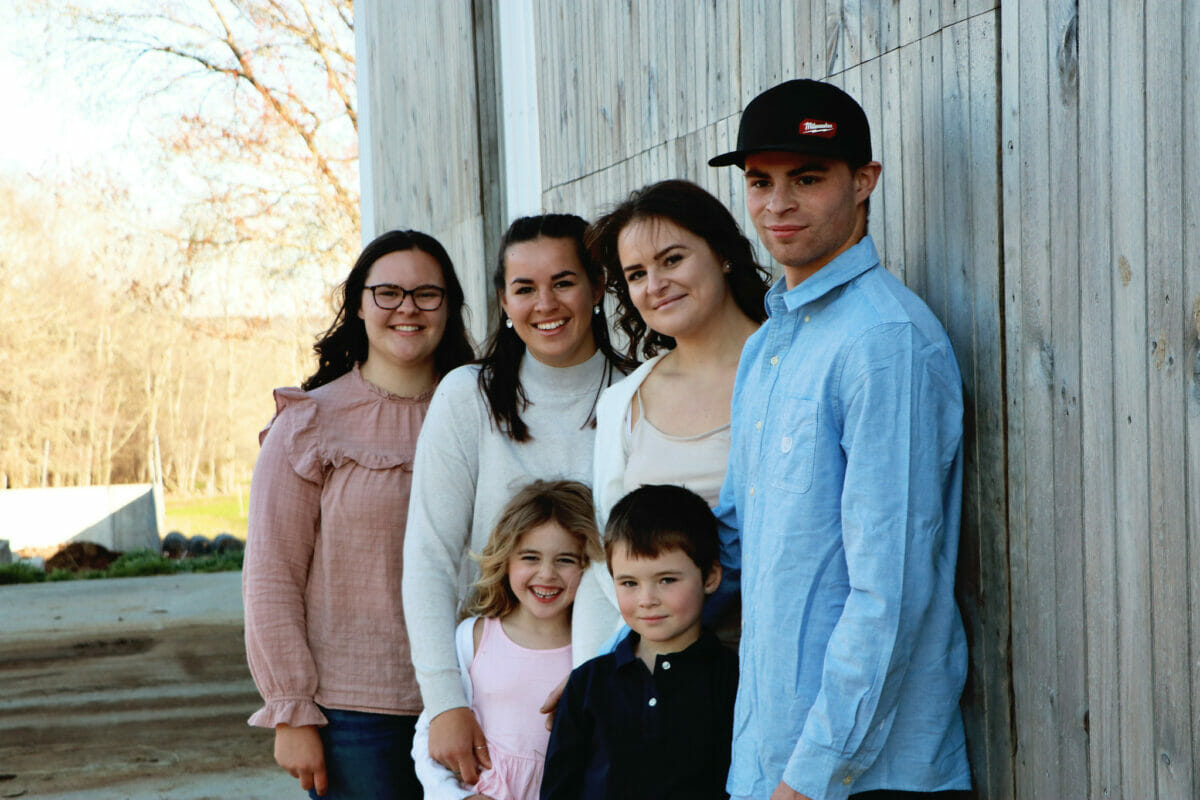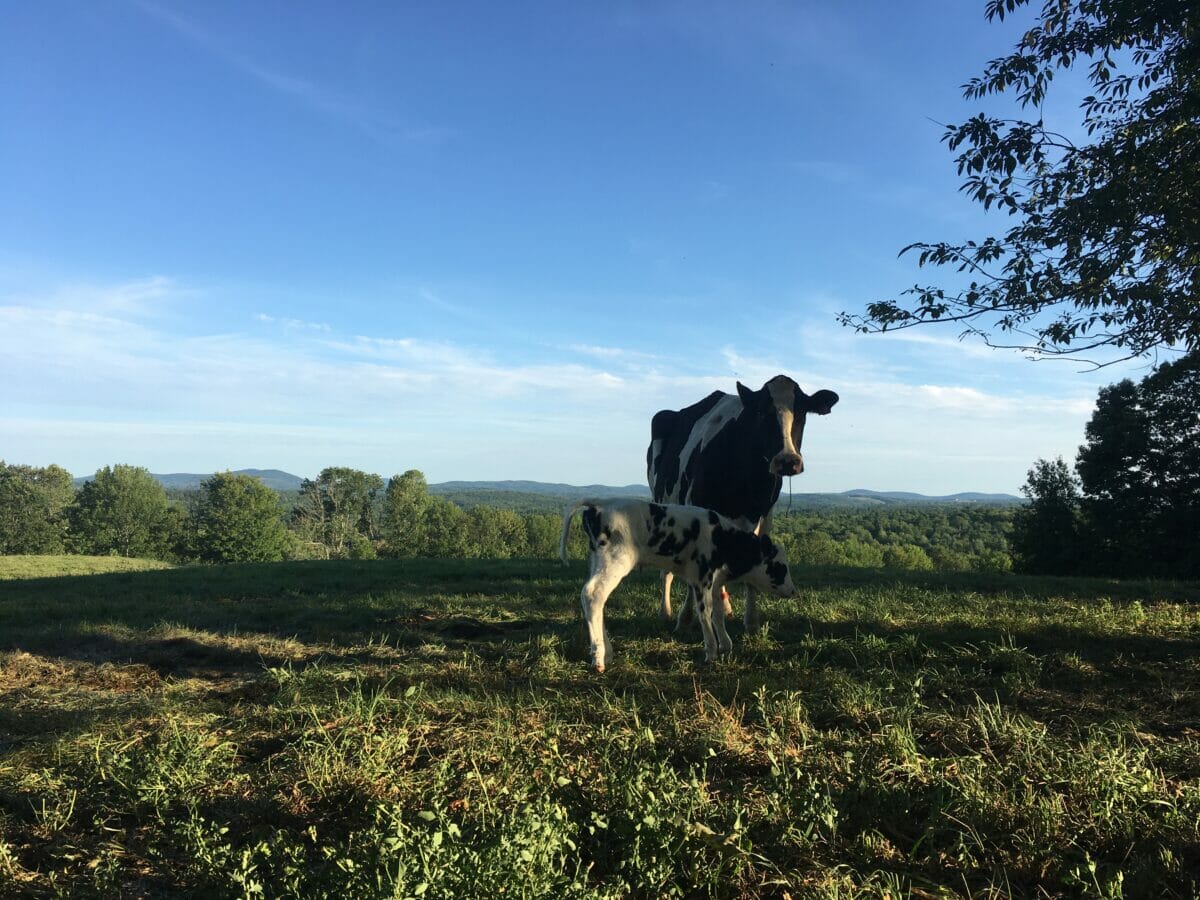Northeast Organic Dairy Farmers May Get Squeezed Out of Business
The affected farms are taking a major hit after Danone, which owns Horizon Organic, terminated 89 contracts.
Northeast Organic Dairy Farmers May Get Squeezed Out of Business
The affected farms are taking a major hit after Danone, which owns Horizon Organic, terminated 89 contracts.

Dairy farmer Sadee Mehuren washes a brown Swiss cow named Sesame on her family farm in Searsmont, Maine.courtesy of Faithful Venture Farm.
In late August, 89 Northeast organic dairy farmers were informed by Danone that their contracts with Horizon Organic, which the French-based company owns, will be terminated in August 2022. The affected farms in New York, Maine, Vermont and New Hampshire are part of a larger trend of decline in small dairy farms driven by milk pricing and consolidation.
The fourth-generation dairy Faithful Venture Farm in Searsmont, Maine was not surprised to receive its notice, says Sadee Mehuren, who operates the farm with her father, grandfather and five siblings in the tiny town near Maine’s midcoast region.
The Mehurens have been shipping their milk to Horizon since 2008, when they transitioned the dairy to organic. Their 45 registered Holsteins produce around 2,700 pounds of milk a day, and they also raise beef animals and a handful of sheep.
Faithful Venture, along with the 13 other Maine organic dairy farms that received termination letters, are part of the state’s 196 dairy farms, 40 percent of which are organic. As Maine’s second largest agricultural product, dairy accounts for more than $570 million a year, according to the Maine Dairy Industry Association. A hit of this size is likely to have a ripple effect on local economies and farm-related businesses.

Dairy is the top agricultural product for the three other states. New York’s dairy sector, which had 46 affected farms, is the fourth largest in the nation. Vermont, where 28 of the terminated farms reside along with Cabot Creamery and Ben & Jerry’s Ice Cream, is the largest producer of milk in New England. Even New Hampshire’s two affected farms will impact its shrinking dairy sector, now numbered at 95 farms.
“It’s a pretty big deal for a processor to withdraw from an entire region,” Maine Organic Farmers and Gardeners Association (MOFGA) executive director Sarah Alexander recently told the Lewiston Sun Journal as MOFGA, along with eight other organic farming organizations, sent two petitions to Danone.
The first petition asked Danone to reverse its decision, while the second asked the Certified B Corp company to “come to the table to find a solution,” extend the termination date to give farmers 18 months instead of 12 to plan for the transition and offer a contract severance or retirement package to the farmers, many of whom have been with the company for more than a decade.
“It’s potentially devastating for those farms that have lost their contracts with few if any alternate buyers,” says Katie Baildon, policy co-ordinator for Northeast Organic Farming Association of New York (NOFA-NY), another organization that sponsored the petition. “It’s also a loss for the communities that no longer have access to local organic milk.”
In response to Modern Farmer asking if these petitions will lead to any changes in Danone’s decisions, Chris Adamo, Danone North America’s vice president for government affairs, policy and partnerships, says a number of continuing challenges led to what he called the “difficult decision.” One of those challenges included picking up and transporting milk to the processing facility the company uses.
“Other related factors, unique to this region, include a lack of available processing alternatives, a scarcity of available drivers and long routes, requiring multi-day jobs, further exacerbating the driver shortage,” says Adamo.
He says the notice period of one year “goes well beyond our contractual obligations with the farms and beyond industry norms,” and that the company is in communication with a number of stakeholders, including some of the organizations sponsoring the petition, to look at additional support options.
Danone, which reported revenue of more than 25 billion euros in 2019, says it remains “deeply committed” to its B Corp mission, which includes a goal to have all its North American companies B Corp certified by 2025.
A legacy of decline
“Danone’s announcement was not isolated but part of a pattern of producers throughout the region losing access to markets,” says NOFA-NY’s Baildon.
The Northeast has seen a steady decline in its dairy farms over the last several decades. Baildon’s state of New York has seen a 25-percent decline over the last decade, while Vermont has seen a 37-percent decline, according to a 2020 report from the Vermont Department of Financial Regulation.
While demand for and production of milk in the US is actually on the rise, the number of farms continues to decrease, due to consolidation and low prices set by the market rather than producers, which leads to a cost of production that exceeds the price these small farms can get for their milk.
Many consider the dairy industry as a whole to be in crisis, but small organic dairy farms may be facing even more pressure due to a loophole in the National Organic Program’s rules for organic dairy operations, which enables large organic dairy farms to continuously transition new animals into organic production—an allowance originally intended to be used once, says Baildon.
Known as the Origin of Livestock Rule, the loophole within it “harms the integrity of the organic label and puts those farms who do not exploit the loophole…at a competitive disadvantage to larger operations in other regions of the country that have created oversupply conditions that impact the organic milk market nationwide,” says Baildon.
While NOFA-NY and other organic farming organizations have called on the USDA to fix the loophole for decades, it still remains in effect.
Danone says the rule “had no bearing on the decision we made,” citing a letter written by Adamo to the National Organic Program in 2019 asking it to close the loophole and outlined previous actions the company has taken on the issue. Adamo says the approximate herd size of a Horizon Organic farm today is 97 cows and, after August 31, 2022, it will be approximately 100 cows, which will come from 500 organic farms across the country.

What’s next for these farmers?
It is unclear whether or not other organic companies will have the capacity to take on any of these producers. The dynamics of production, transportation and processing differ in each state. In New York, a facility located in the western part of the state will still process milk for Horizon from farms within a 300-mile radius, while in the more remote state of Maine, there are no large processing facilities for the state’s organic milk.
Some farmers are putting their hopes in Stonyfield Organic, which last month announced it will be looking into taking on some of the affected farms. The company is currently creating a task force and reaching out to the affected farmers to identify which farms will be the best fit for its direct supply program, which has not added farms for at least three years due to the oversupply in the organic dairy market. The company hopes to offer more information in the next few months.
“During that time, we’ll also be working on strategies to grow the market for organic dairy,” says Britt Lundgren, Stonyfield’s director of organic and sustainable agriculture. “Some of those market strategies may take longer to implement, but our hope is that they will allow us to further grow the opportunity for organic dairy in this region.”
Several state and federal legislatures have made efforts to assist the affected farmers, and working groups have been formed in both Vermont and Maine to not only assist these farmers but look at long-term sustainability of organic dairy farming in the region. Thirteen congressional members from New England signed on to a letter urging the Department of Agriculture to intervene on behalf of these farmers, criticizing the USDA for its continued delay in addressing the origin of livestock loophole.
A spokesperson from the office of Maine’s Representative Chellie Pingree, who signed the letter, says they had not received a formal response yet, “but USDA is working closely with stakeholders, the State Departments of Agriculture, and the New England congressional delegation on next steps for the affected producers and the organic dairy sector in the region as a whole.”
Meanwhile, Mehuren is optimistic about the future of her family’s dairy and hopes the value of small family farms will not be lost. “As a family, we strive to provide our community with a connection to local agriculture and hope that, despite the challenges that face the Maine dairy industry, we will be able to continue farming for many generations,” she says.
Follow us

This work is licensed under a Creative Commons Attribution-NoDerivatives 4.0 International License.
Want to republish a Modern Farmer story?
We are happy for Modern Farmer stories to be shared, and encourage you to republish our articles for your audience. When doing so, we ask that you follow these guidelines:
Please credit us and our writers
For the author byline, please use “Author Name, Modern Farmer.” At the top of our stories, if on the web, please include this text and link: “This story was originally published by Modern Farmer.”
Please make sure to include a link back to either our home page or the article URL.
At the bottom of the story, please include the following text:
“Modern Farmer is a nonprofit initiative dedicated to raising awareness and catalyzing action at the intersection of food, agriculture, and society. Read more at <link>Modern Farmer</link>.”
Use our widget
We’d like to be able to track our stories, so we ask that if you republish our content, you do so using our widget (located on the left hand side of the article). The HTML code has a built-in tracker that tells us the data and domain where the story was published, as well as view counts.
Check the image requirements
It’s your responsibility to confirm you're licensed to republish images in our articles. Some images, such as those from commercial providers, don't allow their images to be republished without permission or payment. Copyright terms are generally listed in the image caption and attribution. You are welcome to omit our images or substitute with your own. Charts and interactive graphics follow the same rules.
Don’t change too much. Or, ask us first.
Articles must be republished in their entirety. It’s okay to change references to time (“today” to “yesterday”) or location (“Iowa City, IA” to “here”). But please keep everything else the same.
If you feel strongly that a more material edit needs to be made, get in touch with us at [email protected]. We’re happy to discuss it with the original author, but we must have prior approval for changes before publication.
Special cases
Extracts. You may run the first few lines or paragraphs of the article and then say: “Read the full article at Modern Farmer” with a link back to the original article.
Quotes. You may quote authors provided you include a link back to the article URL.
Translations. These require writer approval. To inquire about translation of a Modern Farmer article, contact us at [email protected]
Signed consent / copyright release forms. These are not required, provided you are following these guidelines.
Print. Articles can be republished in print under these same rules, with the exception that you do not need to include the links.
Tag us
When sharing the story on social media, please tag us using the following: - Twitter (@ModFarm) - Facebook (@ModernFarmerMedia) - Instagram (@modfarm)
Use our content respectfully
Modern Farmer is a nonprofit and as such we share our content for free and in good faith in order to reach new audiences. Respectfully,
No selling ads against our stories. It’s okay to put our stories on pages with ads.
Don’t republish our material wholesale, or automatically; you need to select stories to be republished individually.
You have no rights to sell, license, syndicate, or otherwise represent yourself as the authorized owner of our material to any third parties. This means that you cannot actively publish or submit our work for syndication to third party platforms or apps like Apple News or Google News. We understand that publishers cannot fully control when certain third parties automatically summarize or crawl content from publishers’ own sites.
Keep in touch
We want to hear from you if you love Modern Farmer content, have a collaboration idea, or anything else to share. As a nonprofit outlet, we work in service of our community and are always open to comments, feedback, and ideas. Contact us at [email protected].by Catie Joyce-Bulay, Modern Farmer
November 8, 2021
Modern Farmer Weekly
Solutions Hub
Innovations, ideas and inspiration. Actionable solutions for a resilient food system.
ExploreExplore other topics
Share With Us
We want to hear from Modern Farmer readers who have thoughtful commentary, actionable solutions, or helpful ideas to share.
SubmitNecessary cookies are absolutely essential for the website to function properly. This category only includes cookies that ensures basic functionalities and security features of the website. These cookies do not store any personal information.
Any cookies that may not be particularly necessary for the website to function and are used specifically to collect user personal data via analytics, ads, other embedded contents are termed as non-necessary cookies.
Lot of problems here. Shrinking market, small herd sizes, only one customer (Danone/Horizon), transportation difficulties… not a viable situation. Pinning your hopes on yet another sole customer (Stonyfield) won’t solve the basic problems. Doesn’t look like there’s enough money there for a farmer’s co-op and that still wouldn’t solve the shrinking market problem. In fact, the value of the entire Maine dairy industry (about $570 million yearly) is basically a rounding error in the personal income of some rich folks. It’s time to look for other options, probably ones that don’t involve milk cows. Until dairy products become scarce and… Read more »
I live in Yorkshire UK the Dairy farm near me doesn’t have any problem selling the milk our local milk man delivers door to door he has never been busier
Something to think about i am an organic dairy farmer in the netherlands and we sel our milk in a cooperative of 200 dairyfarmers we sel the milk to the creamerys who need it and we do not ..have a plant of our own we usuually get a better price and our producerscoop takes care of the shipment of the milk it maybe an optio n for the affectet farmers we can deliver what ever milk and volume the creameries want. .
Welcome. Fresh grass fed angus farmer in vt. Forest road beef. By half or whole in fall. Scott mears. 6th gen.
Incredible. And we have a problem getting Horizon products where I shop, here on the West Coast. Miracle when I find Horizon whipping cream. What a shame.
⛳🇵🇦🇧🇷 La historia de esta familia en producción de leche orgánica es de admirar su esfuerzo en unidad, le felicitamos…
Stop using animals. They are NOT ours to use. Healthy plant based milks are the future. Evolve.